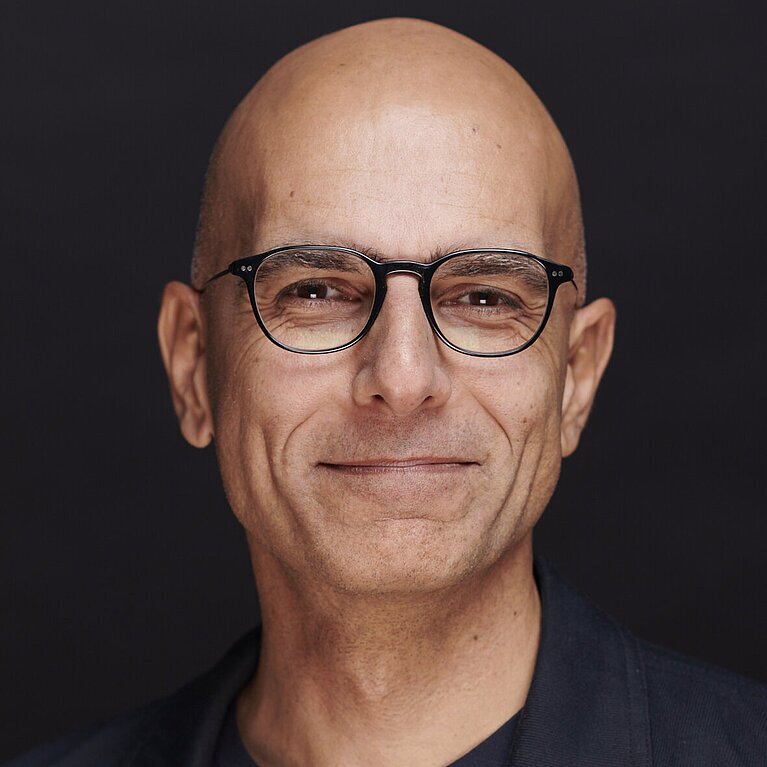

Being edgy is good. Very good, actually. “After all, we get paid to be edgy," says Danusch Mahmoudi, who has headed the Munich Designit studio for three years. "Our clients don't want yeahs-sayers, but partners they can lean on to meet the challenges of the future." And plenty there are. Transformation has caught on in the German economy. Digital and organizational changes affect all business areas, even entire business models. Design plays a key role in the process, and it goes far beyond functional objects.
In the past, we were tasked with designing, say, a medical device. Today, it's about interconnecting products and services in an ecosystem.
The strategic innovation consultancy Designit was founded in 1991 in Aarhus, Denmark, and has been an independent brand of Wipro Limited since 2015.

The Munich studio illustrates the transformation of the world of work: lounge areas alternate with noise-proof retreats, and a long table encourages people to eat together. Collaboration and flexibility are also key features of the Designit working model. In a playing field dominated by technological developments, global crises and social change, companies need to continuously adapt. Mahmoudi describes it like this: "Companies as well as many stakeholders feel that something new is needed." However, no one can say what exactly that is, he says. Their job is to identify the people's real needs. To do so, they involve Designit in the design process from scratch, bringing all stakeholders to the table, such as users, employees from different departments and numerous other experts.

"Hierarchy-free. Prejudice-free. Hence design is more and more about designing a process than an artifact. For us designers, our primary role is to listen in order to subsequently implement the ideas that have been developed cooperatively. This participatory approach is rooted in our Scandinavian corporate DNA, which has always put people at the center of its design." Designing just for the sake of it, he adds, practically doesn't exist anymore. "We live in an era that confronts us with such complex issues that designers can no longer shape them on their own," states the studio director. "The creativity of our time is called participation."
But what does this collaboration look like? Pens and stickers, post-its and play-doh like at a Design Thinking workshop? "Not exactly, but but also not entirely wrong," says Mahmoudi. In the healthcare sector, for example, the focus lies on the direct exchange with doctors, patients and nursing staff. That's how solutions emerge that hold added value for everyone, he says. " Our Designit motto is: Form follows humanity." Through exchange, ideas are conceived and then discarded again when a better one comes to pass. Design grows with the experts involved. And because in our times design means permanent change, the focus often lies on innovation and innovation support.

Mobility for all:
VeloHUB, prototype of a modular mobility hub for large cities, was developed together with citizens and interest groups.
We now stand in front of a fully automatic coffee machine, another Designit creation, and treat ourselves to two espressos. Here, too, the coffee machine is part of an entire business model and not just a mere design object. The interaction with users is important is the interaction with users, explains Mahmoudi. They should experience the brand holistically and get excited about it. Of the approximately 700 "Designits," 34 are based in Germany. Sometimes they join forces with other studios, in the In the health sector, they are currently collaborating with colleagues from Oslo and Madrid. "We see ourselves as a community," says Mahmoudi, "with Designit Germany we are kind of a Gaulish village. Each Designit village has its own very particular culture and operates for the most part independently. But when the Romans appear at our gates, we team up." The Romans? Those are the big projects, he explains, where they pool the best expertise from all the studios. And his role in that of Majestix? "No," the trained graphic designer chuckles. "I’m more of a Miraculix, someone who works out the chess moves and keeps realigning the focus again and again."
The interview with Danusch Mamoudi first appeared in mcbw mag 2023.
